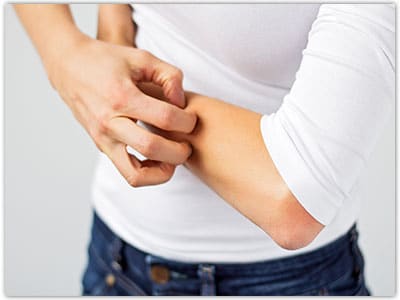Due to an immense number of medically recognized skin conditions and disorders, it can be tough for the untrained eye to distinguish one type from another. Two of the most commonly confused skin disorders are eczema and psoriasis. While both are troublesome and can lead to itching and irritation, the terms cannot be used interchangeably. Each disorder has its own cause, appearance, and symptoms, and each requires a strategic treatment regime to target these specific factors.
WHAT IS ECZEMA?
Eczema, or atopic dermatitis, is a common skin disorder that affects more than 30 million Americans, in some form, each year. It is common in infants and young children, and while many adolescent sufferers eventually grow out of eczema symptoms, millions of adults remain plagued by the disorder throughout their lives.
Allergies or stress can trigger a number of different eczema types, though the disorder tends to run in families. Characterized by red, bumpy, or scaly rashes and intense itchiness, eczema most commonly appears on the backs of the knees and arms. The rashes associated with eczema, however, can appear anywhere on the body. Scratching the rash may result in oozing, bleeding, and even infection.
WHAT IS PSORIASIS?
Psoriasis, which affects around 7.5 million Americans, is a relatively common chronic skin disorder that also comes in several forms. Plaque Psoriasis, however, is the most usual type, and it affects significantly fewer people than eczema. The skin disorder is actually classified as an autoimmune disorder and, like eczema, is influenced by genetics.
Those who are affected regenerate skin cells much more quickly than the average person. For comparison, it would take a person unaffected by psoriasis around one month to regenerate skin cells. The skin cells of a person with psoriasis, however, regenerate as often as every three to four days. The end result is a buildup of dead skin cells on the surface of the skin. The affected skin then appears raised and red with a visible silver or white coating of dead skin cells.
Like eczema, psoriasis outbreaks can occur anywhere on the body, although typical locations include the elbows, scalp, and knees. These patches are prone to bleeding and cracking, and they may be itchy or otherwise painful.
DIFFERENT IN TREATING ECZEMA AND PSORIASIS
While there are some similarities between eczema and psoriasis, the two require different approaches when it comes to treatment. Neither of these disorders is considered “curable,” although they are both manageable. For those with eczema, moisturizing is crucial. Treatment regimes for mild cases will typically include a series of moisturizers and topical ointments, along with avoiding known triggers and testing for allergies. When it comes to psoriasis symptoms, conditions may be worsened by some medications, so an evaluation of daily medications is helpful. In moderate cases, psoriasis can be managed with moisturizers and corticosteroids. For more severe cases, a daily medication may be prescribed in an attempt to slow the process of skin cell regeneration.
RESEARCH STUDIES FOR ECZEMA AND PSORIASIS AT INTERNATIONAL CLINICAL RESEARCH
If you suspect that you may be suffering from eczema or psoriasis, contact the professionals at IC Research today. The experienced skin care experts will be able to accurately identify which of the two disorders you are experiencing and develop an effective treatment regime to provide you with much-needed relief. Give us a call at (615) 410-3460 or visit www.icresearchtn.net/studies

